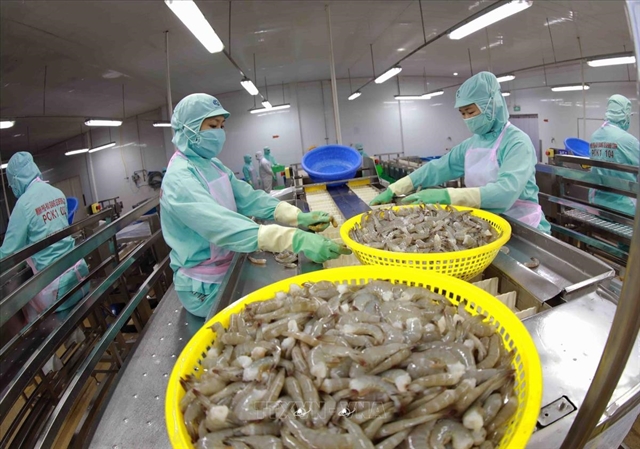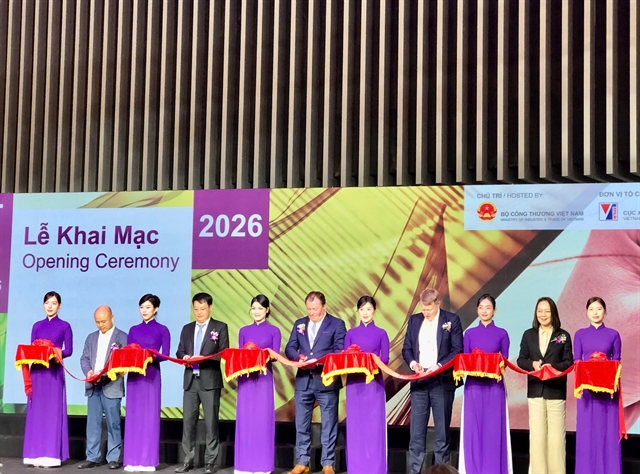 Economy
Economy


|
| The fourth meeting of the ASEAN Sugar Alliance being held in HCM City yesterday by ASEAN Sugar Alliance and TTC Group. — VNS Photo |
HCM CITY — There will be a global sugar deficit of about 2.5 million tonnes in 2019-20, and prices are expected to harden, the fourth meeting of the ASEAN Sugar Alliance heard in HCM City yesterday.
Sasathorn Sanguandeekul, market analyst, futures trading and risk management at Thailand's MITR Phol Sugar Corp Ltd, said in 2018-19 -- the crop starts annually in September -- there was a surplus of two million tonnes.
A deficit would occur this year mostly due to a reduction in output in major sugar producing countries, including Thailand, he said.
“In 2019-20 with the expectation of reduction in Thailand and India, Asia should have a deficit of around 9.5 million tonnes.”
Output in Brazil, the world's largest sugar producer and exporter, in 2018-19 “decreased to 26.5 million tonnes due to ageing canes, drought and low sugar mix ratio. While sugar production in 2019-20 is forecast to be around 26-28 million tonnes”.
But Brazil was still maximising ethanol production, reducing sugar output, she said.
India had large surpluses in 2017-18 and 2018-19. But the output is expected to reduce this year due to unfavourable weather, according to the analyst.
China's production is expected to be 11.63 million tonnes in 2018-19 and around 11.2 million tonnes in 2019-20, less than its demand.
China has to import around 4.5 million tonnes.
Indonesia is another deficit market. In 2018-19, it is expected to produce around 2.37 million tonnes while consumption is expected to increase to 7.11 million tonnes.
Thailand’s production will be around 14.6 million tonnes in 2018-19 and in 2019-20, due to the drought and farmers switching to other crops, its production is pegged at around 13 million tonnes.
According to Lê Xuân Trung, general secretary of the Việt Nam Sugar and Sugarcane Association, Việt Nam has a capacity to process 162,300 tonnes of sugarcane per day.
It produced 1.2 million tonnes of sugar in the 2018-19 crop, 300,000 tonnes down from the previous year.
With a reduction of 15-20 per cent in the area under cane in 2019-20, sugar production is likely to be one million tonnes.
According to experts, after years of surpluses in the world market, the likelihood of a deficit in 2019-20 will be an opportunity for sugar companies, including TTC Sugar.
Sasathorn Sanguandeekul said: “Sugar prices will trade back in the range of 12-13.5 cents per pound in the short run. In the long run, we estimate the range can rise to 12.5-14.5 cent due to the deficit.”
A representative of Malaysia’s Central Sugar Refinery Sdn Bhn spoke about his country’s new sugar development in – “Better Brown” – a low glycemic sugar.
This brown sugar offers many benefits such as helping reduce absorption of sugar into the blood stream, fight obesity and diabetes, improve the taste and flavour of recipes, and absence of chemicals or genetic modification.
Organised by the ASEAN Sugar Alliance and TTC Group, the meeting also discussed regional trade agreements, sugar and health issues, ethanol market development, among other topics.
Đặng Văn Thành, chairman of TTC, said: “Facing challenges in supply and demand and global climate change, the governments of Southeast Asian countries have taken early supportive action including drastic measures to help their sugar industry retain a competitive advantage.”
The fourth meeting was an opportunity for members to exchange information and make strategic decisions to benefit the future of the Southeast Asian sugar industry, he said.
The ASEAN Sugar Alliance, established in 2016, is a platform for sugar industries in the region to exchange views and co-operate in areas of mutual interest, fostering the development of the industry and make it more competitive globally. — VNS




